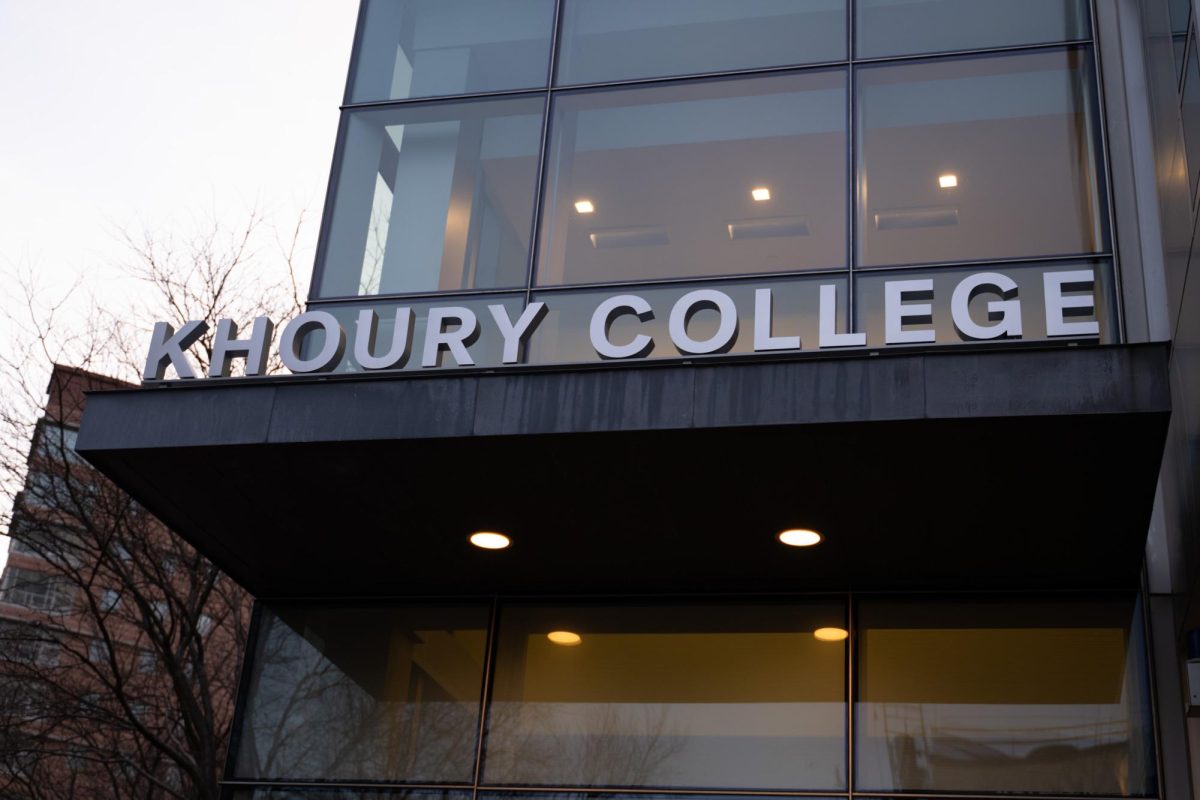The News has dedicated Special Sections for the next quarter, soley to semester conversion coverage. The following is the first installment of coverage.
As the ball dropped in Times Square, and the clock struck midnight in the Krentzmen Quad, a realization set in among the Northeastern community – it’s coming.
Northeastern faculty and administrators have more to uphold than their New Year’s resolutions in 2003 — they must convert the university to semesters in less than nine months.
So far this year, the university has published a semester course equivalencies handbook, which can be accessed online or picked up in the Student Services Office. The handbook allows students to compare how courses convert from quarters to semesters and vise versa.
At the beginning of the academic year, President Richard Freeland reminded the university that the final transition year is imperative at his State of the University Address.
“This year [is] particularly important [because] we are now in the final year of our transition to a semester calendar. Much good work has been done, but many critical tasks remain. This is another challenge that involves every member of this community, and it is one we must meet at a very high level of effectiveness,” Freeland said.
Administrators involved in the calendar transition said they are confident in the conversion and how it will effect the student experience, but stressed that academic advising is essential.
“It is very important for students to get in and do their planning with their academic advisors so we can plan ahead. The last thing we want to do is hire an instructor the day before classes start. That is not the way we like to do business,” said Executive Vice Provost Coleen Pantalone.
Ann Comer, the communications manager for the Provost’s office, stressed the importance of juniors obtaining senior clearance this quarter.
“Particularly the class of 2004 and arts and sciences. They must go in and see their advisor and secure their graduation clearance; they must do it this quarter,” Comer said.
The Student Government President Richard Schwabacher said that with over 13,000 students attending NU, every student is unique and needs their schedule to be handled individually. With that in mind, he said advisors have been voicing frustrations. One in particular told him last week, “I’m beginning to give up.”
“I don’t want to hear that,” Schwabacher said.
Why are we converting?
Executive Vice Provost Pantalone heads up the task of converting to semesters. She names three reasons why Northeastern needs to covert; pedagogy, co-op and a universal calendar.
“Arguments have been consistent, that the big argument is that it is pedagogically better way to do the semesters,” said Pantalone. “Our calendar matches the rest of the world. It will be easier to study abroad. Right now, we jump through hoops to make semester programs into quarter programs. We make it work, but timing wise it’ll work better for students.”
Although Pantalone said the conversion is a positive change, students that are accustomed to the quarter system may have a hard time adjusting at first.
“Students who start here; it’s what they know. They don’t know that it’s too short, because it is in fact longer than high school, which has four terms in an academic year. For students that have been here their entire time this will feel very different,” Pantalone said. “Frankly, I understand that if you are in the middle of a program, why would you want it to change? I mean, you know where you’ve been, you know where you’re going, change isn’t necessarily a fun thing for you.”
President Freeland echoed Pantalone’s sentiment of change at Northeastern.
“Every program, every course is being revised, so there will be new requirements. The relationship of co-op to the curriculum is changing,” Freeland said. “The class schedule is being altered. There will be new systems for registration and billing. Virtually every transaction between student and university will be altered.”
Comer cited the changes among co-op, doing away with three month rotations and replacing them with six-month co-ops only. She said semester conversion will enhance the co-op experience, citing that employers prefer six-month rotations over the three month stints.
“For students, it is advantageous because if you are in a position for six months, you actually learn on the job, learn responsibilities … a three month co-op, is not much longer than a summer job. It’s difficult for the employer to train someone new every three months and for the student; how much can you really learn in that short amount of time?” Comer said. “So, it is really intended to enhance both the academic and the co-op experience for the students.”
Although Pantalone and Comer are optimistic about the switch with citing the benefits of converting, student leaders beg to differ. Specifically, in conjunction with a senate resolution that was rejected on Nov. 5, 1999 which stated that the student senate did not approve the calendar change.
“The student government said we do not want to convert to semesters. Student government passed a piece of legislation that said we do not want to switch. We didn’t do that just because we didn’t feel that it would be beneficial to our spring break schedule,” Schwabacher said. “We didn’t want to switch it because we knew that there’s a certain culture here, and we knew that it would be a huge undertaking, and we didn’t have the confidence in the university at the time would be able to pull it off effectively. And, still, the administration felt that this is something that had to happen at Northeastern.”
Although SGA’s unwillingness to convert was not mentioned in the president’s speech, he did acknowledge that the smoother the transition, the higher rate of student success.
“The challenge of student success is directly related to the challenge of semester conversion. We have promised our students that the conversion process will be seamless for them,” he said. “The students should experience the educational benefits of the change while encountering a minimum of conversion-related difficulties.”
Comer said that if students handle their scheduling responsibly, they should graduate on time.
“If they hold their end of the bargain, then the university will hold up it’s end of the bargain. Which is yes, you will graduate on time and your degree will not cost anymore,” Comer said.
“My biggest concern, well, one of my biggest concerns is how we started off with ‘we will not hold any student [acccountable] and now we’ve moved to ‘we will not hold any student [accountable] as long as they follow the correct sequence of classes,'” Schwabacher said. “And now once we hit semester conversion, what is it going to be ‘we will not hold any student [accountable] as long as they follow the current sequence of classes,’ and it just happens to work out nicely? I mean that was my concern from the get go.”
What Schwabacher is referring to is “Northeastern University’s promise to transition students,” which, simply stated, promises students that if they are responsible with following schedules set forth by their advisors and seek advising on the academic, financial and co-op levels, they will graduate on time. This “contract” of sorts, can be accessed on the semester office’s web site, semsesterinfo.neu.edu.
Schwabacher persisted stating that communication is the key to a successful transition.
“Beyond that, I don’t think that the information is being distributed in an effective manner,” Abdelal said. “I think the Provost’s Office is doing a decent job of communicating to the deans and to the upper administration, but after that point, it’s beginning to become very very obscure for the people that have direct interaction with the students.”
Provost Ahmed Abdelal said he has spoken to many people across campus.
“I think there has been a lot of communication. I have learned that it is better to be on the boring side when it comes to semester conversion rather than to assume that everyone is on the same page,” Abdelal said.
Provost Abdelal continued saying he is confident in the status of the conversion process.
“I think I can now comfortably make the statement that our plan takes into consideration everything. And we have tested it, and we have looked at a lot of details carefully,” Abdelal said. “A lot of these details have been tested through meeting with key individuals. We have met with all the deans and chairs in the university and discussed with them the details of semester conversion.”
Executive Vice President for the SGA Michael Romano said that Northeastern needs to put students first.
“If the university operates on the same way as far as not being student centered, then the increasingly nice retention rates that everyone is talking about, won’t be so nice,” Romano said.
What now?
SGA is presenting a senate resolution to the student senate this week, hoping to implement mandatory meetings between students and their academic advisors prior to the spring semester. This piece of legislation submitted by the interim Vice President for Academic Affairs Andres Vargas with approval of the Academic Affairs Committee is an attempt to promote academic success among students through the transition to semesters.
“We don’t have the ability to give up,” Vargas said. “We need to make it [conversion] an issue. We need to go out there. We will do our part and pick up the slack. We aren’t doing our job if kids are un-informed come May.”
A joint senate will be held on Jan. 21 at 5 p.m. in the Raytheon Amipitheater. A debate and election will be held to determine who will fill the vacant position left by Tina Penman. Vargas has assumed the interim position for the past month and said he isn’t going anywhere.
“I won’t let this drop,” he said. “If SGA drops the ball, then it is a reflection on us.”
Schwabacher said there is only so much SGA can do.
“We can only be proactive on so many levels. It’s one of those things that will be retrospective. It’s going to be October of 2003, and we’ll be knee deep in this thing and that’s when we’re going to hear students uproar, and that’s when we’re going to hear the concerns. It’s difficult to figure out your requirements, and now with this semester conversion. I can’t comprehend how some people are going to be able to get out of here on time,” Schwabacher said.









